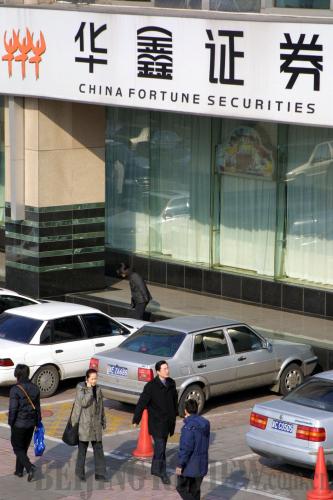|
 |
|
SETTING UP A JV: China Fortune Securities Co. Ltd. is preparing to launch a joint venture with Morgan Stanley (CFP) |
New members will soon join the roster of Chinese foreign securities joint ventures—JPMorgan Chase is preparing one with First Capital Securities Co. Ltd., and Morgan Stanley is partnering with China Fortune Securities Co. Ltd.
The joint ventures were approved by the China Securities Regulatory Commission (CSRC) on December 31, 2010, and will start business operations in the second quarter this year.
The joint venture between First Capital and JPMorgan Chase JV will be headquartered in Beijing and the one between Morgan Stanley and China Fortune Securities, headquartered in Shanghai. In each joint venture, the foreign party holds 33 percent of the shares, the maximum shares foreign parties can hold in securities joint ventures in China.
At the end of 2010, the CSRC approved three securities joint ventures, with the third one between the Royal Bank of Scotland and Guolian Securities Co. Ltd., approved last November.
Thus, 10 securities joint ventures have been set up in China since it entered the WTO in 2001 and opened its securities market.
Meanwhile, Citigroup is going to team with Central China Securities Co. Ltd. and Australia's biggest investment bank Macquarie Group Ltd. is also planning a joint venture with Hengtai Securities Co.
Foreign banks like the Hongkong and Shanghai Banking Corp. Ltd., Hang Seng Bank Ltd. and the Bank of East Asia, Ltd. have also shown an interest in looking for partners to establish securities joint ventures in China.
The reason foreign securities companies are accelerating their steps in China is simple: They are optimistic about the growth of the Chinese securities market. According to a PricewaterhouseCoopers (PwC) report, in 2010, 349 companies made initial public offerings (IPOs) in China's A-share market, ranking first in the world. These companies raised funds worth 478.3 billion yuan ($72.7 billion), hitting a record high. PwC estimates in 2011 capital raised may be around 400 billion yuan ($60.8 billion).
With their capital advantages, advanced management concepts and mature operation experience, foreign investment banks will be a powerful rival of domestic securities companies by establishing joint ventures.
Small and medium-sized Chinese securities companies also dream of cooperating with foreign partners. In China there are more than 100 securities companies. According to the CSRC statistics, in 2009, China Fortune Securities Co. Ltd. ranked 30th among all Chinese securities companies by underwriting 7.8 billion yuan ($1.18 billion) worth of stocks, while First Capital Securities Co. Ltd. ranked 33rd by underwriting 6.75 billion yuan ($1.02 billion). With help from Morgan Stanley and JPMorgan Chase, the two Chinese securities companies may see higher growth in the future.
Zigzag opening
China's securities market was born in 1990. The country's first joint venture investment bank—China International Capital Corp. Ltd. (CICC)—was established in 1995, with Morgan Stanley being one of its foreign partners. CICC is qualified for underwriting stocks issued by Chinese listed companies.
After the country became a WTO member in 2001, its securities market was opened to foreign companies.
However, to protect the fledgling market, China only allows foreign securities companies to enter the Chinese securities market by cooperating with Chinese partners. The country also formulated the Rules for the Establishment of Foreign-Shared Securities Companies. According to the rules, foreign securities companies can hold no more than 33 percent of shares in securities joint ventures; securities joint ventures can only be engaged in IPOs of domestic companies and brokerage of foreign stocks, but not allowed for brokerage of domestic stocks and derivatives business.
| 